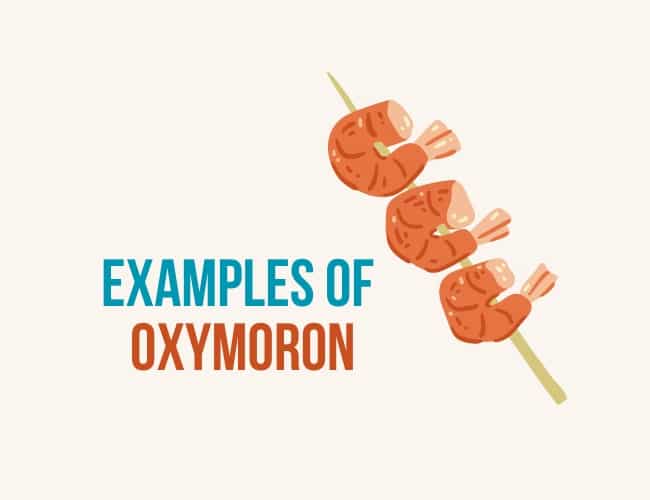Do you know any wise fools? Have you ever seen a jumbo shrimp? Experienced a deafening silence? Tasted bittersweet chocolate? Found a picture pretty ugly? Declared something awful good? Those are examples of oxymorons.
What, then is an oxymoron? Let's take a look.

What is an Oxymoron? Definition
According to Merriam-Webster, an oxymoron is “a combination of contradictory or incongruous words (such as cruel kindness).
In other words, an oxymoron is a figure of speech that catches our attention by juxtaposing two opposites or mutually exclusive terms to express an idea. Often, though, the words are contradictory or incongruous only when used with specific meanings.
What do I mean? Let's take a look at the examples in the first paragraph.
“The movie was awful good.” How can something be awful and good at the same time? Aren't they opposites? One meaning of “awful” is “exceedingly disagreeable or objectionable.” But in the phrase “awful good,” it's an intensifier with the meaning “exceedingly great.” So, we're really saying that something is exceedingly good; it just sounds like a contradiction because of awful's other meaning.
The same is true for “pretty,” which can mean “to some degree” as well as “pleasant to the vision or hearing.”
Shrimp as a noun is a kind of shellfish, and they are rated by comparative size, so a jumbo shrimp is a large shellfish, not a big little person—though that could be a valid oxymoron of its own.
Deafening has the extended meaning of “very noticeable,” so a deafening silence is one that catches your attention.
While the above examples may not be technically contradictory, they appear so, and we see them as oxymorons because of the words' other meanings. Two of the examples are truly contradictory, though.
Bittersweet means simultaneously distasteful and pleasant. The term comes from the sense of taste and is often applied to chocolate to describe dark chocolate with little sugar, so we get the sensation of chocolate's pleasant taste combined with acrid astringency.
What about a wise fool? We commonly call them sophomores. Second-year students in school carry the moniker because of their attitude: they often consider themselves wise but still remain ignorant. Or as the Apostle Paul puts it, “Claiming to be wise, they became fools.” (Romans 1:22 ESV)
Origin of Oxymoron
Where does the term come from?
Oxymoron is a combination of two Greek terms: oxy, “sharp” and mōros, “stupid.” It dates from the 1650s in the sense of “a figure of speech that conjoins words or terms that appear contradictory in order to make a point.”
Today, it simply means two words that are (seemingly) contradictory or incongruous.
Oxymoron vs Paradox vs Contradiction in Terms
A paradox is also a figure of speech that places two contradictory things together.
The difference from an oxymoron is that a paradox juxtaposes contradictory ideas whereas an oxymoron places incongruous words together.
A contradiction in terms also juxtaposes two items that we consider mutually exclusive, but the words themselves are not contradictory. Two examples of this are military intelligence and business ethics.
Examples of oxymorons in literature
Literature is full of oxymorons. Here are a few examples.
“Parting is such sweet sorrow.” (William Shakespeare, Romeo and Juliet)
Related to our idea of bittersweet (see above), Romeo expresses the idea that the coming separation from Juliet saddens him, but being with her for the moment is pleasant.
“The shackles of an old love straitened him,
His honour rooted in dishonour stood,
And faith unfaithful kept him falsely true.” (Alfred Lord Tennyson, Idylls of the King)
In the poem, Lancelot is tempted by Elaine to cheat on Guinevere—who is cheating on King Arthur with Lancelot. The oxymorons (honour … dishonour; faith unfaithful, falsely true) make sharp the fact that by remaining faithful to Guinevere, Lancelot is being false to his king and friend.
“The Sounds of Silence.” (Paul Simon and Art Garfunkel)
The definition of silence is the absence of sound, so how can we have sounds of silence? The song addresses the difficulties people have communicating with one another.
“The bookful blockhead ignorantly read,
With loads of learned lumber in his head,
With his own tongue still edifies his ears,
And always list’ning to himself appears. (Alexander Pope, Essays of Criticism)
“Bookful blockhead” and “learned lumber” contrast wisdom (or at least education) with stupidity.
“Feather of lead, bright smoke, cold fire, sick health,
Still-waking sleep that is not what it is!” (William Shakespeare, Romeo and Juliet)
Romeo describes the contradictory emotions and aspects of love with this string of oxymorons that highlight his dramatic nature.
O serpent heart, hid with a flow’ring face!
Did ever dragon keep so fair a cave?
Beautiful tyrant, fiend angelical!
…
“A damnèd saint, an honorable villain!”
“Was ever book containing such vile matter
So fairly bound? O, that deceit should dwell
In such a gorgeous palace!” (William Shakespeare, Romeo and Juliet)
Juliet is equally capable of oxymorons. In this speech, she has just learned that Romeo, whom she loves, has killed her cousin Tybalt. She expresses her conflicting emotions and perception of Romeo as her lover and the murderer of her kinsman.
60+ common oxymoron examples
Literature isn't the only place we encounter oxymorons. They are common in daily life. We've already seen a few in the introduction. Here's a list of more. It is by no means exhaustive.
Idle restlessness
Same difference
Passive-aggressive
Frenemy (friend–enemy)
Waking dream
Deeply superficial
Cruel kindness
Tough love
Little Bighorn (A river, where Custer took his Last Stand)
Waking dreams
True Lies (Title of a movie)
Virtual reality
Small crowd
Seriously funny
Original copy
Wake up dead
Grow smaller
Alone together
Controlled chaos
Organized chaos
Deliberate mistake
Definite possibility
Unbiased opinion
Stand fast
Devout atheist
Silent scream
Old news
Open secret
Peaceful war
Strangely familiar
Act natural
Agree to disagree
Make haste slowly
Truly false
Definitely undecided
Working holiday (vacation)
Unbiased opinion
Random order
Living dead
Honest thief
Friendly fire
Even odds
Exact estimate (43)
Bigger half
Civil war
Clearly misunderstood
Darkness visible
Deceptively honest
Eloquent silence
Deliberate speed
Found missing
Freezer burn
Good grief
Icy hot
Idiot savant
Lead balloon
Living sacrifice
Magic realism
Militant pacifist
Negative growth
Soft rock
Tragic comedy (Tragi-comedy)
Conventionally unconventional
Scalding coolness
Man child
Adult child
Liquid gas
Why use an oxymoron as a rhetorical device?
Armed with an understanding of what an oxymoron is and examples from literature and everyday life, the questions remains: When and why should a writer use oxymorons?
Entertainment/Humor: Sometimes, it's simply fun to play with language, and creating oxymorons can inject humor into a text. And humor can be a powerful rhetorical device.
Irony: Oxymorons are, by their very nature, ironic. Employing them in a text brings that irony to the topic or story.
Dramatic Effect: The incongruity of an oxymoron adds emphasis and can be used to make the text more dramatic. Look at the examples from literature again and note how the oxymorons add to the impact of the text.
Demonstrate Linguistic Skill: Sometimes, writers want to show off a bit. This is not generally recommended when writing a story that you want to attract readers, but sometimes, people enjoy a text for the writer's skill, and oxymorons can help demonstrate that skill.
Oxymorons are fun to find and sometimes brilliantly used. They are terrific examples of the flexibility of the English language.
Want to read more about grammar, vocab & literary devices? Check out Robert's post on metonymy here.
What are your favorite oxymorons? Share in the comments.
PRACTICE
Now it's your turn. Set the timer for fifteen minutes. Either listen or read for oxymorons in daily life and make a list of the ones you find most interesting.
Or, try your hand at creating new oxymorons. Even better, write a short text incorporating them for humor, irony, dramatic effect, or just show off.
When finished, post your practice in the Pro Practice Workshop and leave feedback for a few other writers, too.

Robert Harrell
Robert Harrell is a grammar nerd—and a language teacher, medieval re-creationist, musician, traveler, and theologian. His interests inform his stories and coaching. Published in German, Spanish, and French, with two English-language YA/NA series underway, Robert is pursuing The Write Practice Book Coach Certification to help other writers excel. Learn more at his website.



0 Comments